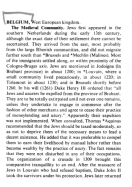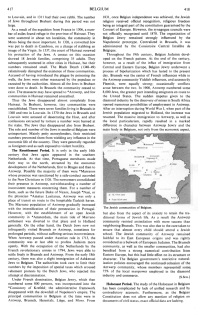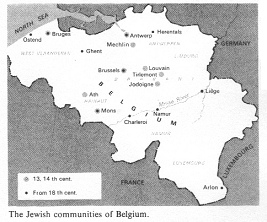Jews in Belgium 01: Middle Ages<BELGIUM, West European kingdom.
Jews coming from the Netherlands - expulsions - taxes - Black Death expulsions - Portuguese Jews coming from the Netherlands - Jewish connection Amsterdam-Belgium
from: Belgium; In: Encyclopaedia Judaica 1971, vol. 4
presented by Michael Palomino (2008)
Share:
The solution is the Book of Life with Mother Earth - www.med-etc.com
The Medieval Community.
[Jewish influx from the Netherlands - expulsion from Brabant 1261 - taxes]
Jews first appeared in the southern Netherlands during the early 13th century, although the exact date of their settlement there cannot be ascertained. They arrived from the east, most probably from the large Rhenish communities, and did not migrate further south than *Brussels and *Mechlin (Malines). Most of the immigrants settled along, or within proximity of the Cologne-Bruges axis. Jews are mentioned in Jodoigne (in Brabant province) in about 1200; in *Louvain, where a small community lived precariously, in about 1220; in Tirlemont in about 1230; and in Brussels shortly before 1260.
In his will (1261) Duke Henry III ordered that "all Jews and usurers be expelled from the province of Brabant. They are to be totally extirpated until not even one remains, unless they undertake to engage in commerce after the fashion of other merchants and agree to cease their practice of moneylending and usury."
Apparently their expulsion was not implemented. When consulted, Thomas *Aquinas recommended that the Jews should be taxed moderately, so as not to deprive them of the necessary means to lead a decent existence. He added that it was preferable to compel them to earn their livelihood by manual labour rather than become wealthy by the practice of usury.
The fact remains that they were not disturbed in any of their occupations.
[Jewish refugees from France in Hainaut province 1306 - crusade massacre 1309 in Louvain - return and protection - libel murder in Cambron]
[[...]] As a result of the expulsion from France in 1306, a number of exiles found refuge in the province of Hainaut. They were scattered in about ten localities, the community in Mons being the most important. [[...]]
The organization of a crusade in 1309 brought this comparative tranquility to an end. After the massacre of Jews in Louvain who had refused baptism, Duke John II took the survivors under his protection. Jews later returned (col. 416)
to Louvain, and in 1311 had their own rabbi.
The number of Jews throughout Brabant during this period was not large.
[[...]]
In 1326, a converted Jew was put to death in Cambron, on a charge of stabbing an image of the Virgin. In 1337, the count of Hainaut renewed his protection of the Jews. A census on this occasion showed 18 Jewish families, comprising 35 adults. They subsequently scattered in other cities in Hainaut, but their numbers remained small.
[Black Death massacres 1348-49 - almost complete disappearance of the Jews - Jews at stake in 1370 and disappearance from Brabant]
The Black Death (1348-49) calamitously disrupted the existence of these communities. Accused of having introduced the plague by poisoning the wells, the Jews were either massacred by the populace or executed by the authorities. Almost all the Jews in Brabant were done to death. In Brussels the community ceased to exist. The massacre may have spread to *Antwerp, and few communities in Hainaut remained unscathed.
Thus the Jews disappeared almost completely from Hainaut. In Brabant, however, tiny communities were reestablished. There were seven families living in Brussels in 1368 and two in Louvain. In 1370 the Jews in Brussels and Louvain were accused of desecrating the Host, and after confessions extracted by torture a number were burned at the stake. The Jews thus disappeared also from Brabant.
The role and number of the Jews in medieval Belgium were unimportant. Mainly petty moneylenders, their restricted numbers prevented them from wielding any influence in the economic life of the country. They were generally regarded as foreigners and as such exposed to violent hostility.
The Resettlement Period.
[Portuguese Jews coming from the Netherlands in 16th century - centers Bruges and Antwerp - Marranos from Portugal - main center Amsterdam - Jewish connection Amsterdam-Belgium]
It is only in the early 16th century that Jews again appeared in the southern Netherlands. At that time, Portuguese merchants made their way to the north, attracted by the economic development of the Netherlands, first to Bruges and then to Antwerp. Possibly the majority of them were *Marranos whose presence was sanctioned by a safe-conduct accorded to the New Christians in 1526.
[[The port towns became attractive for commerce because of racist colonialism with Africa, Asia and the "Americas" and the new "colonialist" products]].
The newcomers consolidated their presence in Antwerp, notwithstanding a number of inconsistent measured concerning them. For a number of them, such as the future Duke of Naxos, Joseph *Nasi, or the physician *Amatus Lusitanus, Antwerp was only a place of transit en route to the hospitable Turkish haven. The Marrano population of Antwerp gradually increased with the intensification of their persecution in Portugal. However, with the establishment of an open Jewish community in *Amsterdam, the main tide of Marrano settlement was diverted to that place and to Holland generally. On the other hand, the Dutch Jews now not infrequently visited Brussels or Antwerp, sometimes for prolonged periods, without suffering serious inconvenience.> (col. 417)
Sources
Encyclopaedia Judaica (1971): Belgium, vol. 4, col. 416
Encyclopaedia Judaica (1971): Belgium, vol. 4, col. 417-418
Encyclopaedia Judaica (1971): Belgium, vol. 4, col. 417-418
Č Ḥ ¦ Ẓ
ā ḥ ī ū ẓ
^
 index
index


